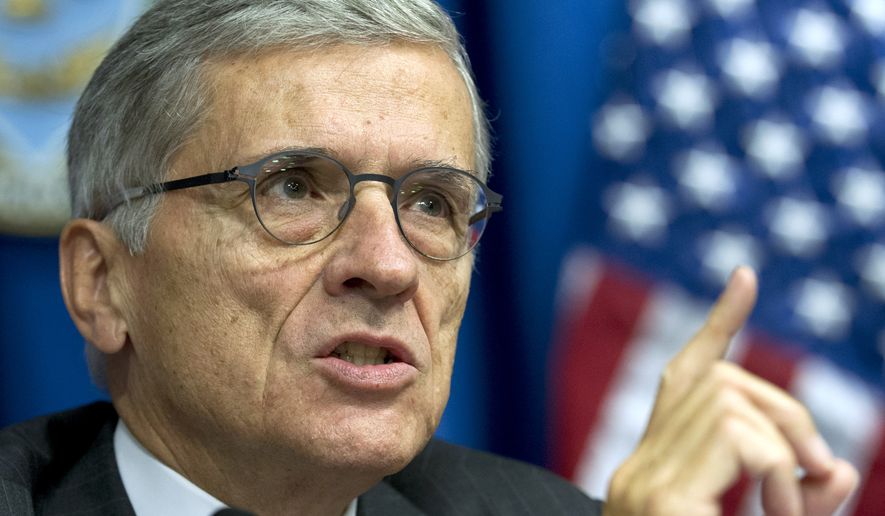OPINION:
On Feb. 26, led by Federal Communications Commission Chairman Tom Wheeler, the agency’s three Democrats will vote to subject the nation’s Internet service providers to the same so-called “Title II” public utility regulatory scheme devised to regulate monopolies like last century’s Ma Bell.
In the nearly 40 years that I have been involved in communications law and policy, including serving as FCC associate general counsel, this action, without doubt, is one of the agency’s most misguided. Regulating Internet providers as public utilities in order to enforce net neutrality mandates will discourage private-sector investment and innovation — and lead to even more special interest pleading at the FCC for favored treatment and heightened litigation for years to come.
With the commission’s two Republican commissioners almost certainly dissenting, the outcome of the vote by the five-member agency now seems foreordained. The job of mitigating the damage will fall to Congress and the courts.
In announcing the upcoming vote, Mr. Wheeler issued a “fact sheet.” The truth is that by its sins of commission and omission, the fact sheet is anything but factual. Briefly, here are three important points you should understand — but which won’t be gleaned from the FCC’s fact sheet — about what the agency is about to do.
First, despite Mr. Wheeler’s claims that the FCC will not engage in “rate regulation,” it will. Understandably, Mr. Wheeler doesn’t want to use the verboten words because he wants to avoid conjuring up images of old-fashioned rate regulation applying to a large swath of today’s Internet ecosystem.
Once Internet providers are placed in the utility regulatory regime, though, either immediately or in the not-too-distant future, the agency likely will regulate Internet usage tiers, require modifications to so-called “zero-rating” plans such a T-Mobile’s popular Music Freedom program, and control prices for interconnecting facilities throughout the Internet — which, after all, is a vast network of interconnected networks. In each of these instances, the practical effect is the same: rate regulation.
By suggesting otherwise, Mr. Wheeler is playing word games. The FCC can control rates without actually requiring what the fact sheet refers to as the filing of formal “tariffs” or requiring affirmative “rate approval.” Rather, under the Title II utility regime, the agency may simply declare unlawful any practices, including those affecting rates, that Mr. Wheeler considers “unjust or unreasonable” or “discriminatory.” What’s more, read closely, his proposal doesn’t actually forswear the authority to engage in direct rate regulation of all facets of an Internet providers’ business.
Second, Mr. Wheeler suggests that by establishing “bright line” rules — no blocking, no throttling, no paid prioritization — Internet providers will know what is expected from them. Of course, even concepts such as “throttling” and “prioritization,” in the context of a dynamic, evolving Internet, necessarily will be subject to ambiguities leading to ongoing litigation.
But aside from ambiguities regarding the “bright-line” terms, the FCC’s fact sheet contains this foreboding statement: “There must be a known standard by which to determine whether new practices are appropriate or not. Thus, the proposal will create a general Open Internet conduct standard that [Internet service providers] cannot harm consumers or edge providers.”
This supposed “known” but yet open-ended conduct catch-all — “ISPs cannot harm consumers” — confers too much discretion on an agency that has shown itself bent on expanding its power. It is simply an invitation into the unknown, sure to be the source of much future litigation. Decades ago, when I was a Duke University undergraduate, the conduct standard was simply “conduct unbecoming of a Duke gentleman.” I was never sure what that meant then, and no one can know what conduct Mr. Wheeler means to proscribe by his “conduct unbecoming an Internet provider” standard.
Third, what is not acknowledged in the FCC’s fact sheet, but what nevertheless is most relevant, is President Obama’s highly visible, direct intervention in the FCC’s proceeding. Last November, Mr. Obama specifically urged the commission to adopt the Title II utility approach, even though Mr. Wheeler previously had proposed a considerably less stringent version of net neutrality regulation. But after Mr. Obama’s statement, Mr. Wheeler quickly fell into line, perhaps forever altering the way the FCC as an institution is viewed. After all, it is supposedly an “independent” regulatory agency.
A Feb. 4 front-page Wall Street Journal story by Gautham Nagesh and Brody Mullins — “How White House Thwarted FCC Chief on Net Rules” — details secret meetings between White House and FCC officials leading up to Mr. Obama’s announcement. The story ends this way: “[The president’s intervention] essentially killed the compromise proposed by Mr. Wheeler, leaving him no choice but to follow the path outlined by the president.”
I assume the reporters mean to imply that Mr. Wheeler felt he had no choice, as a matter of politics, but to follow the president’s direction. But he did have a choice as a matter of law — because the president, under the current understanding of the FCC’s independence from executive branch control, cannot direct Mr. Wheeler’s actions.
I am not at all certain, but perhaps at the end of the day, the law in this important matter may prevail over politics. For the future of the Internet, we should all hope so.
• Randolph J. May is president of the Free State Foundation.




Please read our comment policy before commenting.